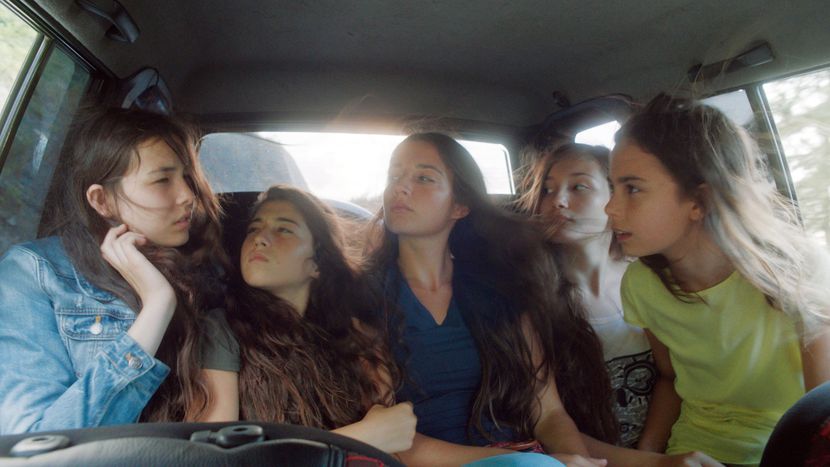
Mustang: Five Sisters Against the World
Published on
Translation by:
Arwen DeweyFranco-Turkish director Deniz Gamze Ergüven first presented a preview of her debut film Mustang at the Institut Français d’Istanbul on the 20th of October 2015. Now, it has been nominated for the 2016 Oscars for best foreign language film. It is powerful, troubling, engaging, feminist, and above all infused with hope.
A handful of houses, a whole lot of trees and the shores of the Black Sea form the backdrop for Mustang's characters, especially (in the words of director Deniz Gamze Ergüven) the "five-headed monster" of the film's sisters. The first few minutes depict the exuberance of the end of a school year: an impromptu swim at the beach, a water fight with some boys, a few apples stolen from a neighbour’s field...
Unfortunately, light-hearted adolescence is not the norm within the girls' traditional environment. When the outraged village learns that they climbed onto the shoulders of teenage boys, their home (where they live with their grandmother and uncle) becomes a cage from which they will not escape again until they are married. Or more specifically, until the "grown-ups" have selected their future husbands.
The plot is reminiscent of Sofia Coppola's The Virgin Suicides, in which teenage sisters are confined because of the puritanism or traditionalism of their society. But it would be wrong to call the film a "Turkish Virgin Suicides." Adolescent rebellion, experimentation and longing for freedom may be universal – and may also be as repressed in America as they are in Anatolia – but the situation in Turkey is not comparable to the USA in the 1970s. What’s more, aesthetics are given less weight. In this resolutely engaged, feminist creation, viewers are invited to discover and question tradition and women's roles in the heart of Turkey.
An engaged, realistic film
One of Deniz Gamze Ergüven's principal accomplishments is not slipping into an overdramatic representation of social realism. Yes, the bars are added one by one to the family's prison. The girls have to wear long, dark dresses and learn to cook traditional dishes in preparation for marriage. The question of virginity is imperative, and the hospital visits to confirm it are shocking. Yes, their uncle is abusive, and death is ever-present, but adolescent impudence doesn't disappear, and offbeat family antics are constant. The director uses humour and comic situations to represent the strength of her characters in response to the horror of their environment.
This is where the boundary between reality and fiction is drawn. The director reminds us that it is common in Turkey to either hear about these kinds of situations – rules against associating with boys, arranged marriages, the requirement for virginity – or experience them first-hand.
In the script the characters exhibit incredible bravery and strength of will. But in the regions, towns, and families where tradition still reigns, the idea of young women being liberated or even imagining a different kind of future for themselves is impossible. As a description of that society, and a denouncement of its evils, this debut film is entirely successful.
Setting aside the film's "political manifesto", issues do remain: there's a certain lack of subtlety common to any first attempt at a full-length feature. Viewers are in for an hour and a half of handholding as they are led to the discovery and condemnation of the girls' fate. Scant room is left for the imagination or for individual interpretations of the film's more extreme characters (the loaded figure of the "evil" uncle, for example), and some situations are needlessly repeated.
Incredible actresses, and hope
Incredible casting mitigates these faults. The five sisters come to life on the silver screen, and captivate us completely. The cinematic talent of the director is partly responsible, and is evident in the shots and frames that bring the sisterhood to life. But the initial choice of these actresses, none of whom had ever acted before, was perfect. Even live, gathered onstage at the Institut Français d’Istanbul for the preview, the group's charisma is undeniable.
Mustang will represent France (where it has already thrilled 500,000 viewers) at the Oscars in February. Perhaps it would have been more logical for the film to represent Turkey? Be that as it may, the main element of the film's success, and the one that most justifies its presentation to the world, is something that’s perhaps missing in The Virgin Suicides: hope.
Striving to reject fatalism, Deniz Gamze Ergüven uses classic filmmaking techniques to create hope. She does this by contrasting negatives and positives. In a decisive moment in the film, the girls are not allowed to go back to school, but the youngest girl's saviour, a female teacher, leaves to start a new life in Istanbul.
Education is presented as a solution. A political hope is expressed poetically. Mustang makes our hearts beat faster.
---
This article was published by our local team at cafébabel Istanbul.
Translated from Mustang : sœurs et contre tous



